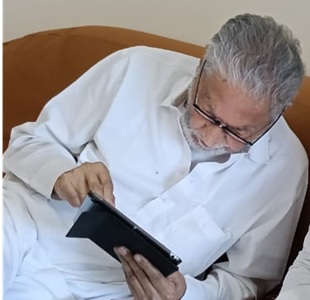By Dr Syed Khurshid Hussain, Mumbai
Throughout history, empires have risen and fallen, often marked by decadence, moral decay, and the exploitation of the vulnerable. Today, as allegations of depravity among modern elites surface, exemplified by the Jeffrey Epstein files, we witness a troubling continuity of age-old crimes. From the Roman Empire to the Ottoman Turks and the Moguls, the powerful have long indulged in excesses, including illicit sex parties and the exploitation of underage girls. This article explores how these patterns persist among contemporary rulers and billionaires, the societal impact of such moral decline, the West’s drift from its Christian roots over the past three centuries, and the potential for spiritual renewal through Islam to restore truth and justice, as inspired by the ideas of Robert Crane.
The Enduring Sins of Empire
Empires, whether ancient or modern, have often been characterized by the moral failings of their ruling classes. The Epstein files, detailing allegations of sex trafficking and abuse involving prominent figures like Donald Trump, Bill Clinton, and others, reveal a disturbing reality: the powerful continue to exploit the vulnerable, echoing the excesses of Rome, where orgies were commonplace, or the Mogul courts, where harems included minors. These modern “rave parties” and illicit gatherings, as uncovered in Epstein’s network, are not isolated but part of a historical pattern where wealth and power shield perpetrators from accountability.
The Epstein case, involving over 250 underage victims, exposes a network of elites who allegedly used their influence to perpetrate and conceal heinous acts. This is not merely a scandal but a symptom of a broader moral decay among those who rule our world. From billionaires like Bill Gates, who associated with Epstein post-conviction, to political figures across party lines, the complicity of the elite underscores a systemic issue. The masses, meanwhile, are left grappling with the fallout, their trust in institutions eroded by revelations of unchecked power.
Historical Parallels: From Rome to Today
The crimes of the powerful are not new. In ancient Rome, emperors and senators indulged in lavish, debauched gatherings, often involving minors, as a display of dominance. The Ottoman Turks and Moguls similarly maintained systems where young girls were exploited under the guise of cultural norms. Today’s empire, led by Western elites, mirrors these patterns. The Epstein files, for instance, reveal a network that allegedly included “prominent American politicians, powerful business executives, foreign presidents, a well-known prime minister, and other world leaders.”
This continuity suggests that power, unchecked by morality, breeds corruption. The allure of wealth and status, as seen in Epstein’s cultivation of an elite social circle, enables such behavior. The public’s outrage, amplified by social media, reflects a growing awareness of these injustices, yet the lack of accountability—exemplified by Epstein’s lenient 2008 plea deal—shows how deeply entrenched these systems are.
The West’s Moral Drift: From Christianity to Enlightenment
Over the past three centuries, the West has undergone a profound transformation, moving away from its Christian foundations toward what has been called the Age of Reasoning or Enlightenment. This shift prioritized rationalism and individualism over spiritual values, leading to a secular worldview that often dismisses moral absolutes. While the Enlightenment brought advancements in science and governance, it also fostered a culture where personal gain often overshadows ethical considerations.
This drift has corrupted the minds of the masses, as media and popular culture glorify materialism and hedonism. The Epstein scandal, for instance, highlights how wealth and fame can normalize deviant behavior among elites, while the public, bombarded with sensationalized content, becomes desensitized or complicit through inaction. The erosion of Christian principles—such as compassion, justice, and accountability—has left a void, allowing figures like Epstein to exploit systemic weaknesses.
The consequences are evident in the public’s disillusionment. As investigative journalist Julie K. Brown notes, “People who are vulnerable and who don’t have a voice in our system are often prosecuted more fully and rigorously than people who have power and money.” This disparity fuels cynicism, as the masses perceive a justice system that protects the elite while ignoring the vulnerable.
The Age of Transcendence: A Call for Spiritual Renewal
In this context, the ideas of Robert Crane, a scholar who advocated for spiritual renewal through Islam, offer a path forward. Crane argued that the West’s moral decline could be countered by an “Age of Spiritual Enlightenment,” where universal values of truth and justice are restored. Islam, with its emphasis on accountability, compassion, and community, provides a framework for this transformation. Unlike the secular individualism of the Enlightenment, Islam prioritizes collective well-being and moral integrity, offering a counterpoint to the excesses of modern empires.
Crane’s vision aligns with the Islamic principle of adl (justice), which demands accountability regardless of status. The Epstein files, for instance, reveal a justice system that failed victims due to elite influence. An Islamic approach would prioritize the victims’ rights, ensuring that no one is above the law. Similarly, Islam’s emphasis on ihsan (excellence in conduct) calls for leaders to embody moral virtue, a stark contrast to the decadence of modern elites.
The Path to Truth and Justice
Restoring truth and justice requires confronting the moral decay of empire. The Epstein case, with its allegations of widespread elite involvement, underscores the need for transparency and accountability. The public’s demand for the release of Epstein’s files, as seen in the backlash against Attorney General Pam Bondi’s claim that no “client list” exists, reflects a hunger for truth. Yet, the continued protection of powerful figures suggests that systemic change is needed.
Islam’s framework offers practical solutions. Its emphasis on community solidarity can counter the individualism that enables elite exploitation. By fostering a culture of mutual accountability, societies can ensure that the vulnerable are protected. Moreover, Islamic teachings on modesty and ethical conduct challenge the normalization of hedonistic excesses, such as the “sex parties” and “rave parties” associated with figures like Epstein.
The global response to the Epstein scandal, amplified by social media and grassroots movements, shows that the masses are ready for change. By embracing spiritual enlightenment, as Crane advocated, societies can move beyond the cynicism of the Enlightenment era toward a future where truth and justice prevail.
A New Dawn
The Epstein files and the historical parallels they evoke reveal a troubling truth: empires, past and present, have often been defined by the moral failings of their rulers. From Rome to the modern West, the exploitation of the vulnerable persists, enabled by wealth and power. The West’s drift from Christianity to secular rationalism has exacerbated this decline, corrupting both elites and the masses. Yet, as Robert Crane envisioned, an Age of Spiritual Enlightenment, rooted in Islamic principles, offers hope. By prioritizing truth, justice, and community, we can break the cycle of empire’s excesses and build a world where the vulnerable are protected, and the powerful are held accountable. The path forward demands courage, transparency, and a return to universal moral values—qualities that Islam, in Crane’s view, can uniquely provide.






0 Comments